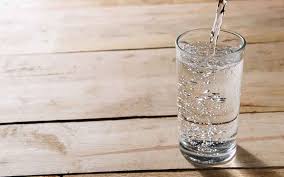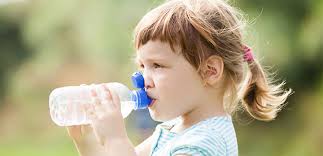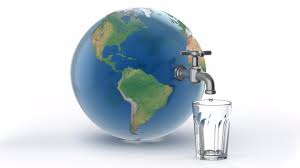Perhaps it is the ubiquitous nature of water that means drinking enough each day is not at the top of many people’s lists of priorities.

To function properly, all the cells and organs of the body need water.
Here are some reasons our body needs water:
1. It lubricates the joints
Cartilage, found in joints and the disks of the spine, contains around 80 per cent water. Long-term dehydration can reduce the joints’ shock-absorbing ability, leading to joint pain.
2. It forms saliva and mucus
Saliva helps us digest our food and keeps the mouth, nose, and eyes moist. This prevents friction and damage. Drinking water also keeps the mouth clean. Consumed instead of sweetened beverages, it can also reduce tooth decay.
3. It delivers oxygen throughout the body

Blood is more than 90 per cent water, and blood carries oxygen to different parts of the body.
4. It boosts skin health and beauty
With dehydration, the skin can become more vulnerable to skin disorders and premature wrinkling.
5. It cushions the brain, spinal cord, and other sensitive tissues
Dehydration can affect brain structure and function. It is also involved in the production of hormones and neurotransmitters. Prolonged dehydration can lead to problems with thinking and reasoning.
6. It regulates body temperature

Water that is stored in the middle layers of the skin comes to the skin’s surface as sweat when the body heats up. As it evaporates, it cools the body. In sport.
Some scientists have suggested that when there is too little water in the body, heat storage increases and the individual is less able to tolerate heat strain.
Having a lot of water in the body may reduce physical strain if heat stress occurs during exercise. However, more research is needed into these effects.
7, The digestive system depends on it

The bowel needs water to work properly. Dehydration can lead to digestive problems, constipation, and an overly acidic stomach. This increases the risk of heartburn and stomach ulcers.
8. It flushes body waste
Water is needed in the processes of sweating and the removal of urine and faeces.
9. It helps maintain blood pressure
A lack of water can cause blood to become thicker, increasing blood pressure.
10. The airways need it
When dehydrated, airways are restricted by the body in an effort to minimize water loss. This can make asthma and allergies worse.
11. It makes minerals and nutrients accessible
These dissolve in water, which makes it possible for them to reach different parts of the body.
12. It prevents kidney damage
The kidneys regulate fluid in the body. Insufficient water can lead to kidney stones and other problems.
13. It boosts performance during exercise
Some scientists have proposed that consuming more water might enhance performance during strenuous activity.
More research is needed to confirm this, but one review found that dehydration reduces performance in activities lasting longer than 30 minutes.
14. Weight loss
Water may also help with weight loss if it is consumed instead of sweetened juices and sodas. “Preloading” with water before meals can help prevent overeating by creating a sense of fullness.
Drinking plenty of water can help you lose weight.
This is because water can increase satiety and boost your metabolic rate.
The timing is important too. Drinking water half an hour before meals is the most effective. It can make you feel more full so that you eat fewer calories.

15. It reduces the chance of a hangover
When partying, unsweetened soda water with ice and lemon alternated with alcoholic drinks can help prevent overconsumption of alcohol.
Kidney damage
Water helps dissolve minerals and nutrients, making them more accessible to the body. It also helps remove waste products.
These two functions make water vital to the kidneys.
Every day, the kidneys filter around 120-150 quarts of fluid.
Kidney stones interfere with how the kidneys work. When present, can complicate UTIs. These complicated UTIs tend to require longer periods of antibiotics to treat them, typically lasting 7 to 14 days.
The leading cause of kidney stones is a lack of water. People who report them often do not drink the recommended daily amount of water. Kidney stones may also increase the risk of chronic kidney disease.
In November 2014, the American College of Physicians issued new guidelines for people who have previously developed kidney stones. The guidelines state that increasing fluid intake to enable 2 litres of urination a day could decrease the risk of stone recurrence by at least half with no side effects.
Dehydration happens if we use and lose more water than the body takes in. It can lead to an imbalance in the body’s electrolytes. Electrolytes, such as potassium, phosphate, and sodium, help carry electrical signals between cells. The kidneys keep the levels of electrolytes in the body stable when they function properly.
When the kidneys are unable to maintain a balance in the levels of electrolytes, these electrical signals become mixed up. This can lead to seizures, involving involuntary muscle movements and loss of consciousness.
In severe cases, dehydration can lead to kidney failure, which can be life-threatening. Possible complications of chronic kidney failure include anaemia, damage to the central nervous system, heart failure, and a compromised immune system.
Sources
During everyday functioning, water is lost by the body, and this needs to be replaced. We notice that we lose water through activities such as sweating and urination, but water is lost even when breathing.

Drinking water, whether from a tap or a bottle, is the best source of fluid for the body.
Milk and juices are also good sources of fluid, but beverages containing alcohol and caffeine, such as soft drinks, coffee, and beer, are not ideal because they often contain empty calories. Drinking water instead of soda can help with weight loss.
It was previously thought that caffeinated beverages had diuretic properties, meaning that they cause the body to release water. However, studies show that fluid loss because of caffeinated drinks is minimal.
Water is an essential nutrient. It is necessary to sustain all forms of life, and humans can only live a few days without it. It is also a healthful drink.
Health authorities and others often encourage people to consume 2 or more litres of water a day, but is this only plain water or does water from other sources count?
Some sources have described these recommendations as a “myth,” and professionals have questioned the guidelines.
Some point to a lack of scientific evidence to support the claims, while others note that promoters of the concept have included a major mineral water producer.
How much plain water do we really need?
Helps maximize physical performance
If you don’t stay hydrated, your physical performance can suffer.
This is particularly important during intense exercise or high heat.
Dehydration can have a noticeable effect if you lose as little as 2% of your body’s water content. However, it isn’t uncommon for athletes to lose as much as 6–10% of their water weight via sweat.
This can lead to altered body temperature control, reduced motivation, and increased fatigue. It can also make exercise feel much more difficult, both physically and mentally.
Optimal hydration has been shown to prevent this from happening, and it may even reduce the oxidative stress that occurs during high-intensity exercise. This isn’t surprising when you consider that muscle is about 80% water. If you exercise intensely and tend to sweat, staying hydrated can help you perform at your absolute best.
Significantly affects energy levels and brain function
Your brain is strongly influenced by your hydration status.
Studies show that even mild dehydration, such as the loss of 1–3% of body weight, can impair many aspects of brain function.
In a study of young women, researchers found that fluid loss of 1.4% after exercise impaired both mood and concentration. It also increased the frequency of headaches.
Many members of this same research team conducted a similar study on young men. They found that fluid loss of 1.6% was detrimental to working memory and increased feelings of anxiety and fatigue.
A fluid loss of 1–3% equals about 1.5–4.5 pounds (0.5–2 kg) of body weight loss for a person weighing 150 pounds (68 kg). This can easily occur through normal daily activities, let alone during exercise or high heat.
Many other studies, with subjects ranging from
children to older adults have shown that mild dehydration can impair mood, memory, and brain performance
Help prevent and treat headaches
Dehydration can trigger headaches and migraine in some individuals.
Research has shown that a headache is one of the most common symptoms of dehydration. For example, a study of 393 people found that 40% of the participants experienced a headache as a result of dehydration.
What’s more, some studies have shown that drinking water can help relieve headaches in those who experience frequent headaches.
A study of 102 men found that drinking an additional 50.7 ounces (1.5 litres) of water per day resulted in significant improvements on the Migraine-Specific Quality of Life scale, a scoring system for migraine symptoms.
Plus, 47% of the men who drank more water reported headache improvement, while only 25% of the men in the control group reported this effect.
However, not all studies agree, and researchers have concluded that because of the lack of high-quality studies, more research is needed to confirm how increasing hydration may help improve headache symptoms and decrease headache frequency
Help relieve constipation
Constipation is a common problem that’s characterized by infrequent bowel movements and difficulty passing stool.
Increasing fluid intake is often recommended as a part of the treatment protocol, and there’s some evidence to back this up.
Low water consumption appears to be a risk factor for constipation in both younger and older individuals.
Increasing hydration may help decrease constipation.
Mineral water may be a particularly beneficial beverage for those with constipation.
Studies have shown that mineral water that’s rich in magnesium and sodium improves bowel movement frequency and consistency in people with constipation.
May help treat kidney stones
Urinary stones are painful clumps of mineral crystals that form in the urinary system.
The most common form is kidney stones, which form in the kidneys.
There’s limited evidence that water intake can help prevent recurrence in people who have previously gotten kidney stones.
Higher fluid intake increases the volume of urine passing through the kidneys. This dilutes the concentration of minerals, so they’re less likely to crystallize and form clumps.
Water may also help prevent the initial formation of stones, but studies are required to confirm this.
Helps prevent hangovers
A hangover refers to the unpleasant symptoms experienced after drinking alcohol.
Alcohol is a diuretic, so it makes you lose more water than you take in. This can lead to dehydration.
Although dehydration isn’t the main cause of hangovers, it can cause symptoms like thirst, fatigue, headache, and dry mouth.
Good ways to reduce hangovers are to drink a glass of water between drinks and have at least one big glass of water before going to bed.
Too much water
Some have raised concerns that consuming too much water could be dangerous.
Not only the amount of fluid in the body but the balance of minerals that is important for maintaining health and life.
Too much water in the body could lead to hyponatremia, or water intoxication when sodium levels in the blood plasma become too low.
Symptoms include:
- lung congestion
- brain swelling
- headache
- fatigue and lethargy
- confusion
- vomiting
- seizures
- coma
- death
Hyponatremia may be a risk for people who use the recreational drug Ecstasy. This is likely due to a variety of reasons including a change in hormone levels, brain chemistry, body function, and kidney function, along with increased sweating and thirst.
People who drink too much water while exercising could also be at risk. In the Boston Runners survey, for example, almost 2,000 of the participants were thought likely to have some degree of hyponatremia due to excessive fluid consumption, and 90 may have finished with critical hyponatremia.
Another risk factor is having certain diseases or using some medications. Diabetes, for example, can lead to excessive thirst. Conditions in which the kidneys cannot excrete enough water, too, can result in this type of problem.
However, just as the body can adapt to higher or lower levels of water and can remind us, through thirst, when we need to drink more, scientists believe an internal mechanism also stops most people from drinking too much water.
Takeaway
There are few scientific measures of how much water we need.
Most studies have focused on how much people consume and assumed that this figure matches or exceeds our needs. It does not determine whether a person is efficiently hydrated or not.
The amount of water a person uses and loses varies according to conditions and activities. Heat, activity, and illness, such as diarrhoea and vomiting, can lead to dehydration.
Most healthy people in a temperate climate consume sufficient fluid to remain healthy while carrying out their daily activities, and around one-fifth to a quarter of this comes from food. Where there is a lack, the body will usually regulate these needs.
Meanwhile, those who work outside or exercise in a hot climate will not be able to get all their water needs from food. They will need additional water.
Perhaps, as Prof. Farrell of Monash University says, “If we just do what our body tells us, we will probably get it right.
End line
Even mild dehydration can affect you mentally and physically.
Make sure that you get enough water each day, whether your personal goal is 64 ounces (1.9 litres) or a different amount. It’s one of the best things you can do for your overall health.
